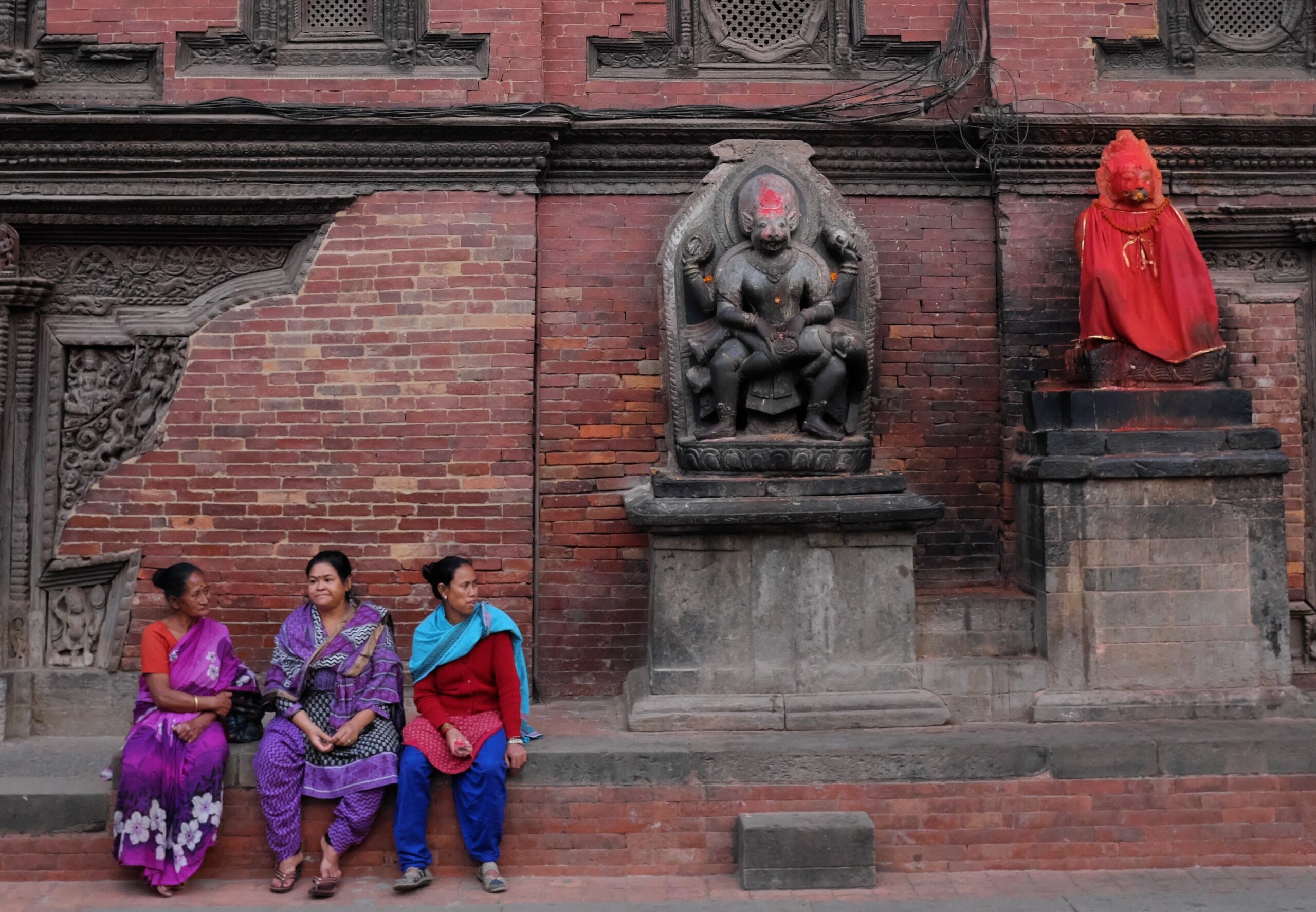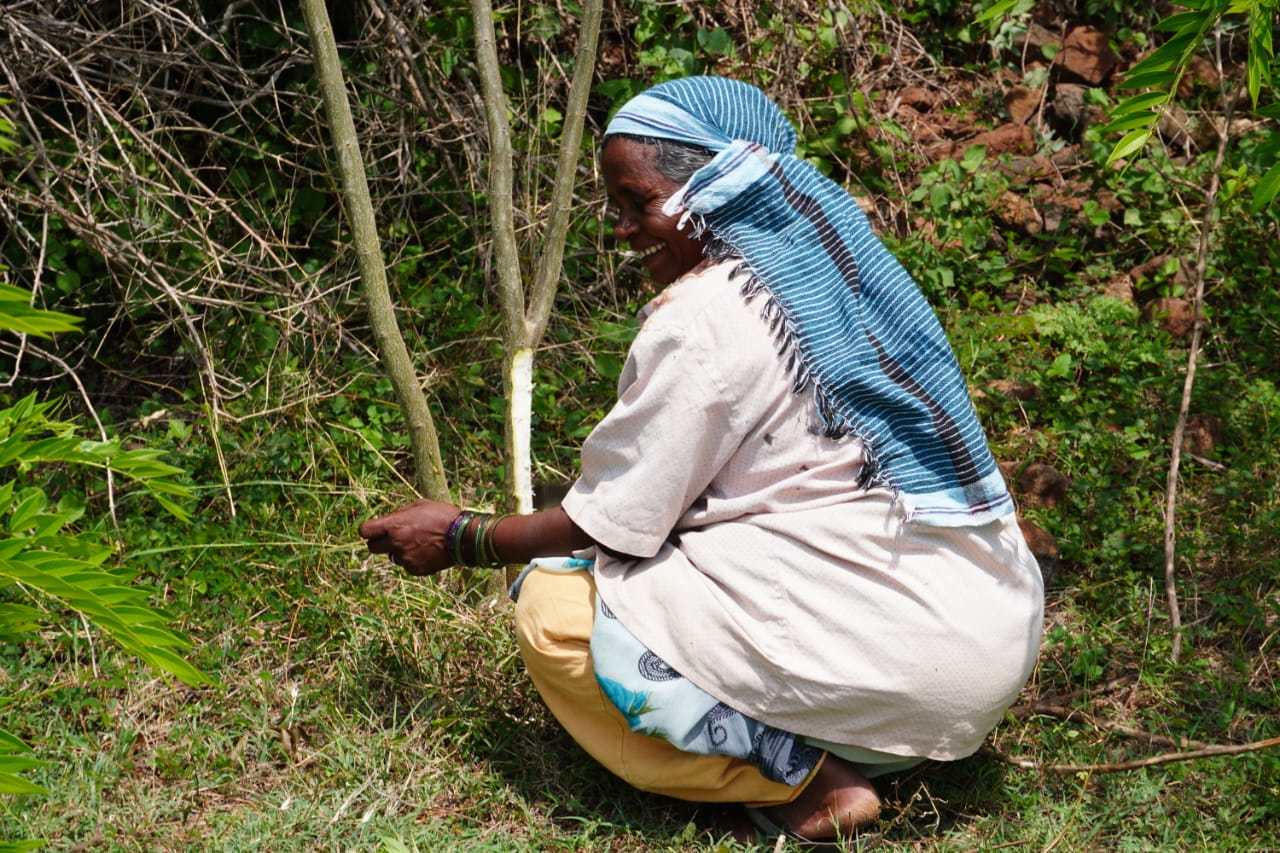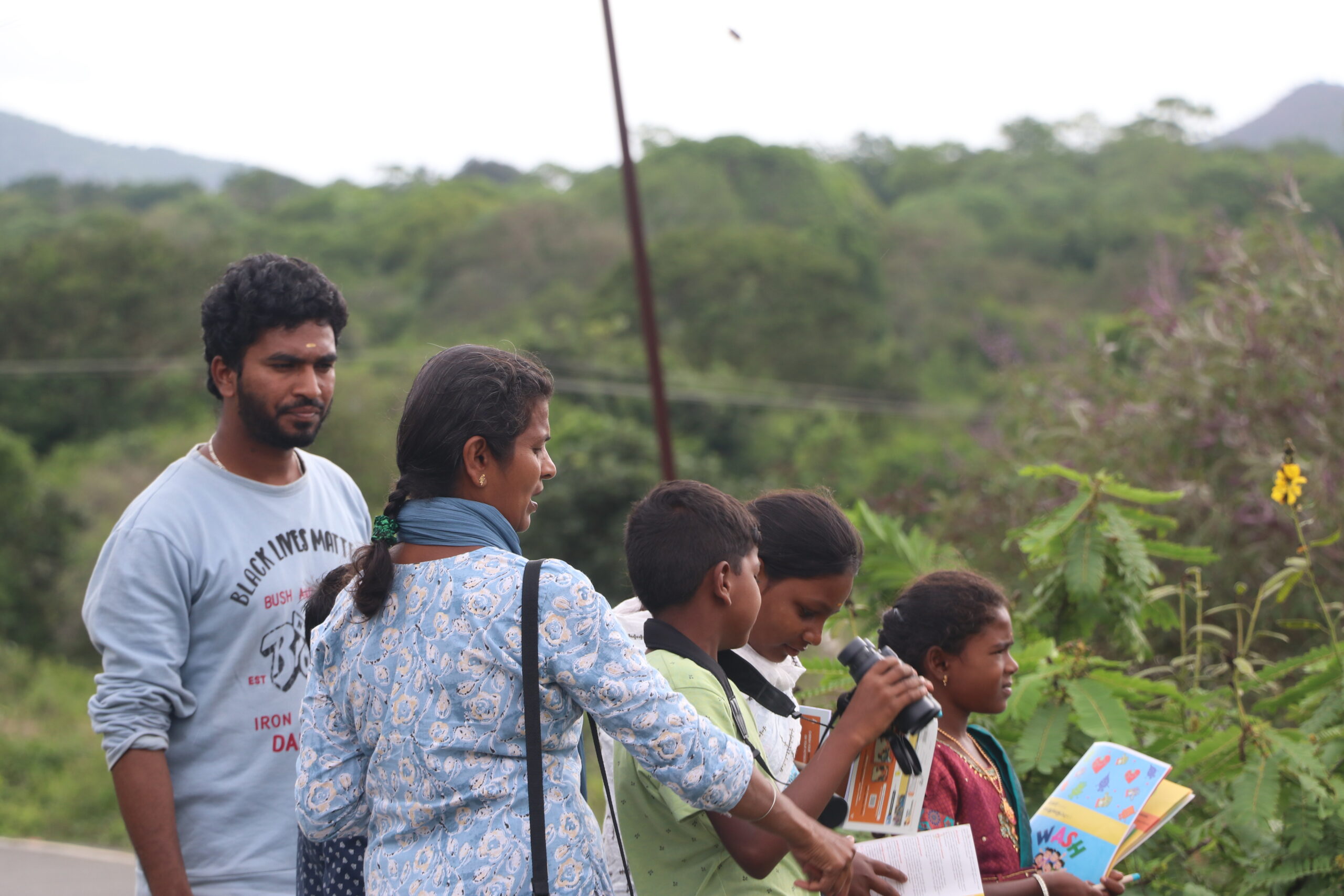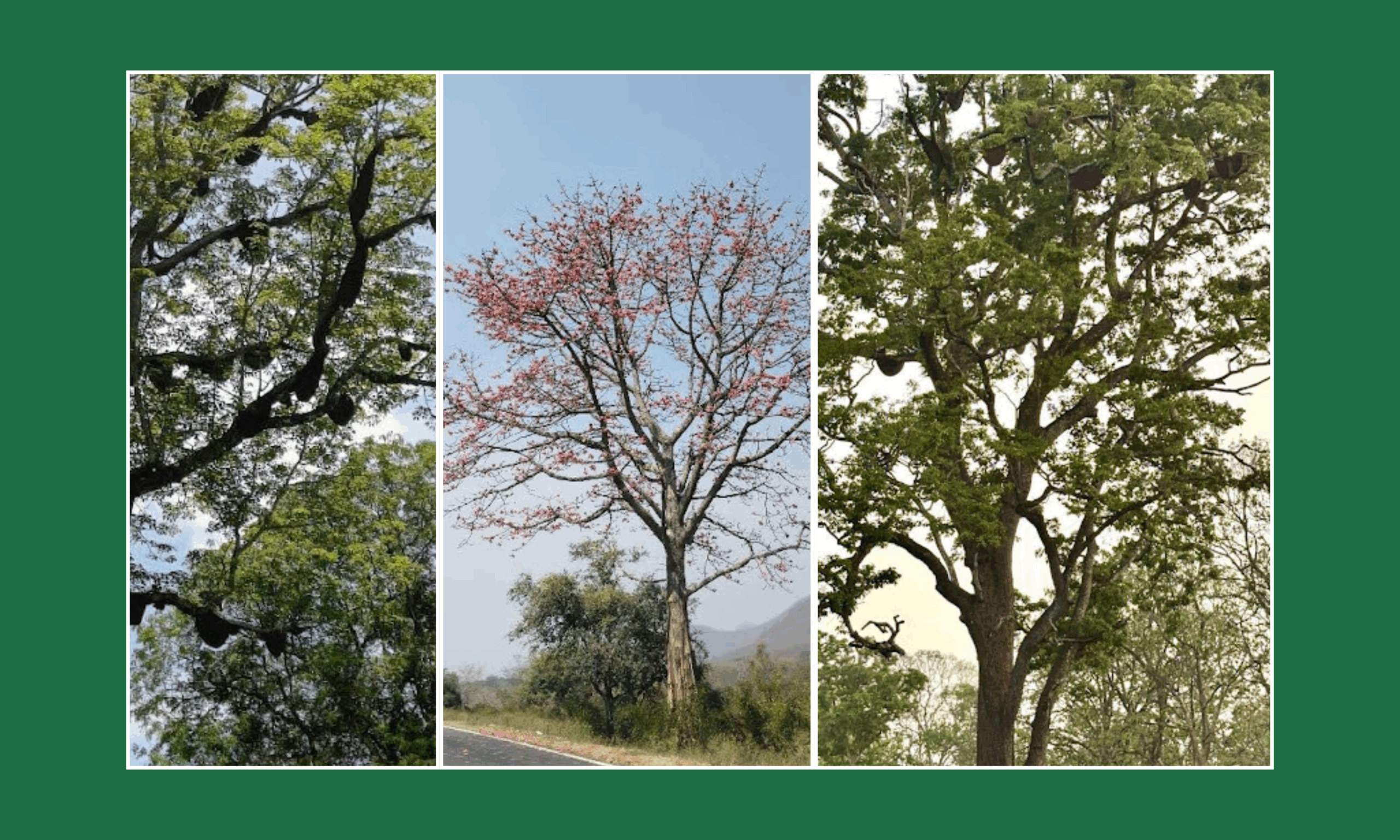By Rohan Mukerjee, Agriculture and Advocacy, Eastern India Programme Coordinator, Networks & Alliances and Ramachandran K G, Programme Coordinator, Community Wellbeing
APEX Workshops in Nepal, October 2024
In October, Rohan Mukerjee and Ramachandran K G visited Nepal for a gathering of Asian People’s Exchange for Food Sovereignty and Agroecology (APEX Network). APEX organized 2 back-to-back workshops for the meeting. The first workshop from 15th to 18th October was on People Led Development Manual Development and the second held from 19th to 23rd October was “People’s Seed Systems: A Learning Exchange”. While Rohan Mukerjee represented Keystone Foundation for the first workshop, both Rohan and K G Ramachandran attended the second workshop. The workshops were hosted by local APEX partner Social Work Institute (SWI) which has its center in Nakhu, Lalitpur. SWI’s years of experience and their work with the People Led Development (PLD) approach for Food Sovereignty and Agroecology were relevant to the objectives of both workshops.
Workshop on PLD Manual development
15-18 October (Kathmandu, Nepal)
This workshop was facilitated by the APEX working group on strengthening food sovereignty movements through PLD. It focused on the PLD principles, practices and pedagogy as practiced by APEX partners with the objective of developing a PLD manual. Present in the the workshop and were Elizabeth Cruzada (Bess) who has worked with MASIPAG and is currently a consultant, Rowena Buena (Weng) from MASIPAG, Philippines, John Sinulingga from Bina Desa Indonesia and Rohan Mukerjee from Keystone Foundation, India. They were supported by members of the APEX secretariat: Terence Krishna Lopez and Diana Bando from PANAP Philippines and Kyle Barber from MASIPAG, Philippines. The target participants for the workshop were partners who have been doing and facilitating the PLD process for the longest time and they included BARCIK from Bangladesh, SWI from Nepal, MASIPAG and PANAP from the Philippines, BINA DESA from Indonesia, PKMT and Roots for Equity from Pakistan, ORISSA and Keystone Foundation from India.
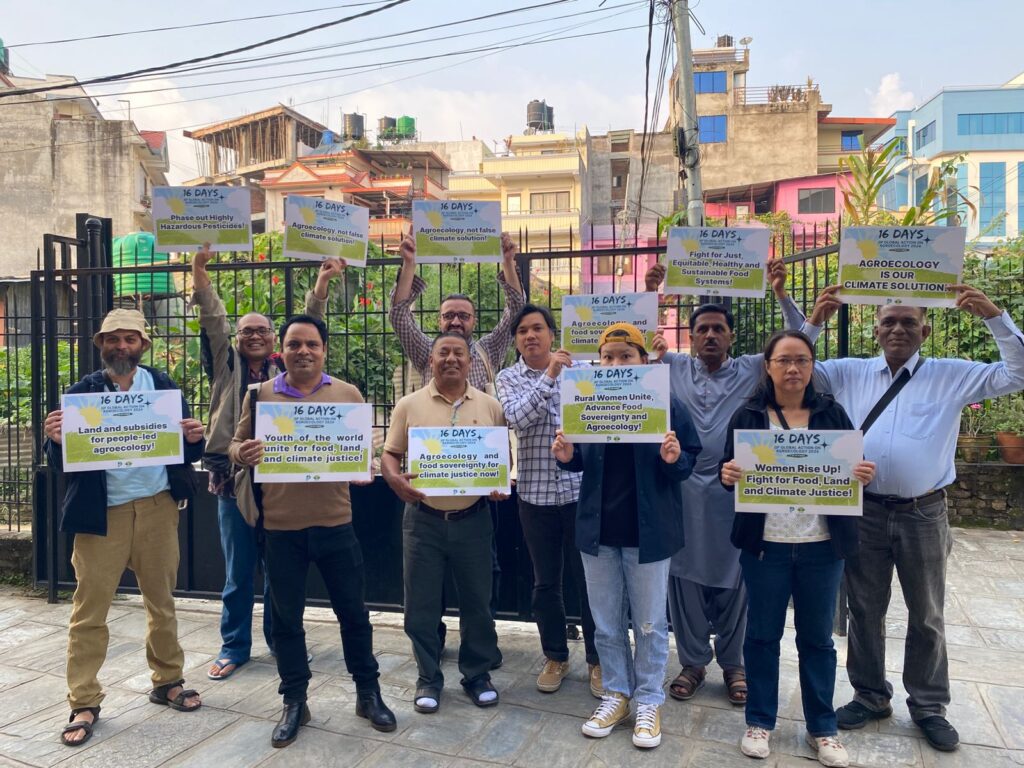
Day 1
The first day of the workshop was chaired by Weng and Bess and started with a round of introductions. Following this was a recap by Kyle of Zoom sessions, the first of which was held in August, in which selected partners shared the history of how PLD came to be in their organisations and practice; and in September, in which lessons and approaches as practiced by long-term PLD partners were shared.
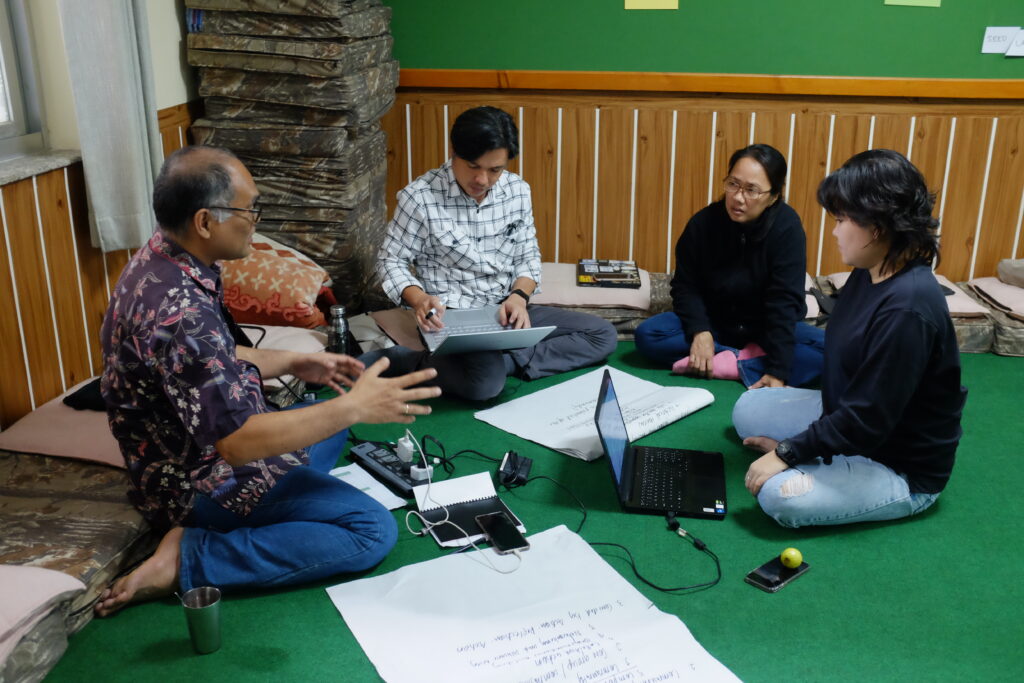
This was followed by the development of a detailed timeline of development of the PLD process, including the journeys of participating organisations who marked significant events in their PLD journey. While the timeline dated back to the Consultancy of Manny Yap in MISEREOR in 2004, it also had references to events prior to 2005. Such events included the Farmer-led Development Animation approach and the Green Revolution, which witnessed farmer’s knowledge being sidelined. The timeline also included the establishment of APEX in 2020 and activities and events since then.
Day 2
On the 2nd day the participants were divided into 3 groups to answer the following questions:
i. What is our analysis of the situation? / Why should we be adopting PLD?
ii. What are the strategic objectives of PLD? What are the non-negotiable principles? (What are the prerequisites?)
iii. What are the core practices for building PLD? Are there stages for building PLD? / How to achieve PLD?
The groups documented their responses on Meta Cards arranged on chart papers and presented their findings in a larger discussion group. This was a fruitful exercise which allowed all to reflect deeply on the concept of the PLD and its future potential, especially when working with local communities for Food Sovereignty and Agroecology. The outcomes of this exercise formed a core part of the planned PLD Guide.
Bess, who has been associated with the development of the PLD process from the initial stages shared her experience of pedagogical practices of PLD covering how PLD is taught and practiced both formally and informally. She also explored expectations and roles of different stakeholders like the community, facilitating organization, and funders and how each of them adapt and operate with regards to a PLD approach.
On the afternoon of October 16th, with Namaraj as our guide, we took a break from the sessions for a tour of the historical city of Lalitpur, also known as Patan. We made our way through a bustling market where people worked and lived alongside ancient temples, buildings and monuments selling a variety of wares ranging from traditional spices, flowers, seedings and utensils to modern appliances and clothes of the latest fashion. Our trail ended at the awe-inspiring Durbar Square which is a listed UNESCO World Heritage Site. It was amazing to see that unlike many historical sites Patan Durbar Square was very much lived in and with tanks and temples dating back to the 17th and 18th Century still in use.
Day 3
The focus of the third day of the workshop was an exercise which involved representatives of each organization listing the different tools and methods they use for the different stages of PLD namely –
• Community Organising
• Movement Building
• Knowledge and Learning Exchanges
The participants listed the tools and methods on Meta Cards and after a presentation by each organization there was a ranking of the different tools. The involved organization would give a Star for the tool which had the greatest impact and other participants would draw a circle for the tool they found most interesting. 3-4 of the tools with most symbols were chosen for each organization and arranged together. It was decided that respective organisations would compile a write up on these selected tools which would be included in the book. Keystone Foundation’s chosen tools included
• Community Organizing
• Timeline of Food Systems
• Kitchen / Nutrition Badi (Homestead) for bringing communities together
• Movement Building
• Forest Rights and supporting communities for FRA claims
• Food Mela
• Gram Sabha – Role and functioning of community institutions and their role in PLD
• Barefoot Ecology
• Knowledge and Learning Exchanges
• Gender and Climate Change Programs / Modules
The workshop concluded with the drawing up with a rough structure for the book, appointing an editorial team which included Bess (Editor in Chief), Alfie from MASIPAG, Rohan from Keystone Foundation and Biswa Mohan from ORISSA. A tentative timeline for bringing out the PLD guide was also drawn up with the next physical meeting tentatively scheduled for September 2025 which would culminate in preparation of first draft by November 2025 with the final guide expected to be ready by June 2026.
People’s Seed Systems: A Learning Exchange October 19-23, 2024 (Kathmandu and West Nepal)
While some of the participants of the PLD workshop returned to their respective countries after the conclusion of the workshop most of the participants stayed back for the second workshop and they were joined by several new participants. This workshop was facilitated by the Transforming Food Systems Working Group and enjoined the members of the team as well as those APEX partners who are interested in learning and contribute in the knowledge building among partners. The People’s Seeds Systems learning exchange was a learning exchange on the seed systems as practiced in the different countries in Asia, particularly those led by small food producers. This activity came at an opportune time when countries are now exploring more repressive policies on seeds as part of their trade commitments, thus catering to the interests of multinational companies and private institutions.
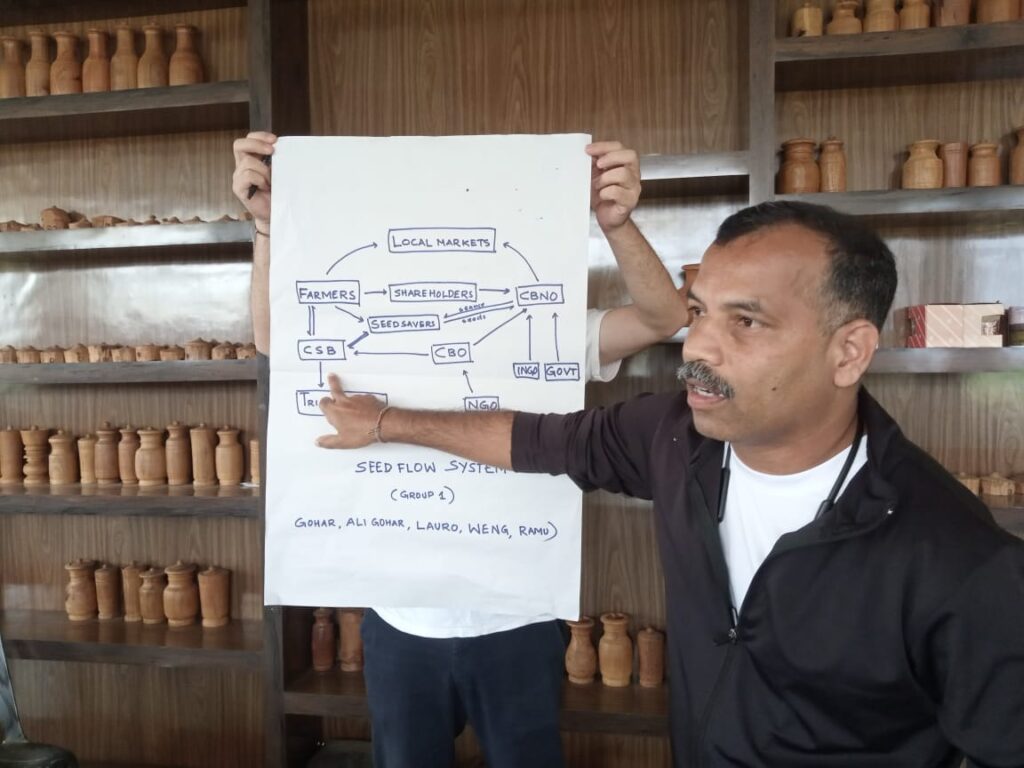
The learning exchange was a combination of: a) sharing and discussions on the issues surrounding food sovereignty and seeds sovereignty from the global to country levels, and b) learning exchange through visit to communities in West Nepal that are taking a stand and creating their own systems to assert their rights to food sovereignty and seed sovereignty through agroecological practices and systems- from collecting to saving seeds, to sharing and cultivation, among others.
The learning exchange commenced at the at Social Work Institute premises on 19th October 2024 with SWI as the host. Rohan Mukherjee and Ramachandran K G represented Keystone foundation in the program. There were 22 participants representing different partner organizations from India, Nepal, Pakistan, Sri Lanka, Bangladesh, Indonesia, Philippines and Vietnam present in the 5 days program.
The sessions started with sessions expressing solidarity with peasant communities.
On October 19, different participant countries presented on the issues of land grabbing and its impact on peasants and seed sovereignty. There was a global review of the world bankprograms and policies that results to land grabbing, food insecurity and climate crisis presented by the Reclaim our Future Campaign of IBON international. 4 partner organizations from Philippines, India, Sri Lanka presented on how the act of land grabbing in the name of development affected the farming communities. Then the organizations from South East Asia and South Asia divided into 2 groups to discuss the future actions points on the issues.
On October 20, the day started with sessions on Impacts of UPOV on Seed sovereignty. Mr. Alfie from MASIPAG introduced briefly about the history of UPOV and how the conditions of UPOV has been undermining the seed sovereignty in Philippines. Mr. Arnold Padilla from PANAP presented on the corporate capture of seeds and their impacton agriculture and the people’s food sovereignty. The organizations were divided into two groups to discuss the seeds systems in their respective territories and plan future strategies and interventions.
Prior to leaving Kathmandu for field visits in Nepalgunj in West Nepal, Namaraj from SWI facilitated a visit to the Boudhanath Stupa. This is a UNESCO world heritage site dating back to the 7th Century that continues to be in use for worship by devotees.
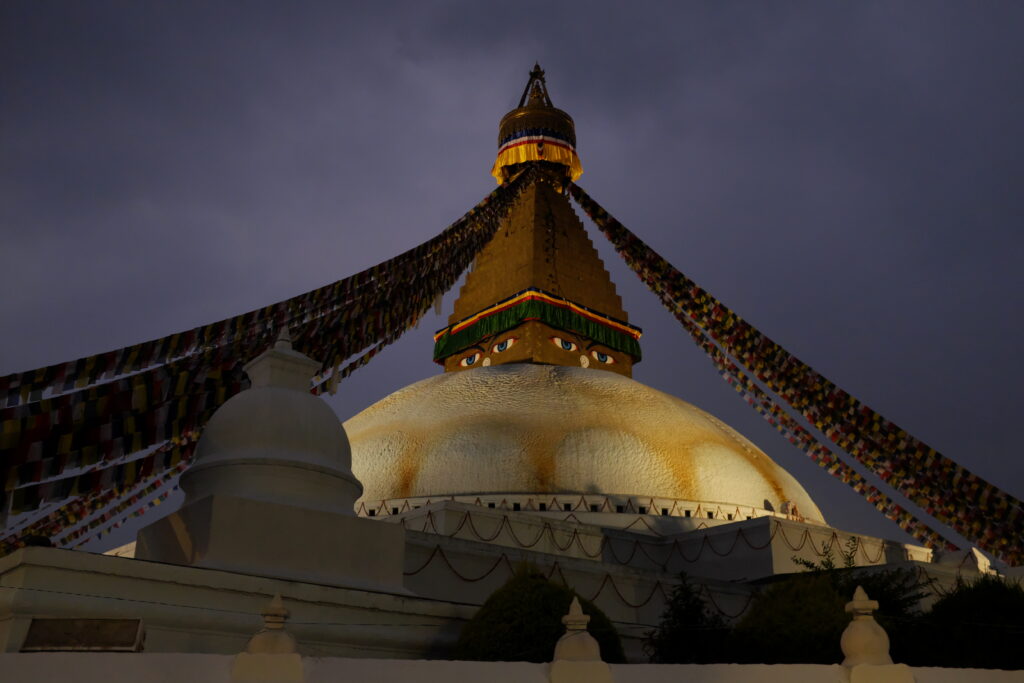
Participants left SWI early in the morning of 21st October and flew to Nepalgunj from Katmandu for further sessions. Over three days, sessions covered country specific seed saving systems, the learning exchange with rural community farmers, and their systems of seed saving and conserving activities.
Learning and Staying in a Community Homestay x Gene Bank
Our accommodation was organized in Gabhar Valley Community homestay near Banke National Park in Lumbini Province. This is a community run initiative of the Tharu community, who were former bonded laborers.
Krishna, a representative of the Gabhar Valley Community Homestay committee welcomed us and provided a brief overview and history of their initiative. He shared that the initiative began 12 years ago and currently involves 26 village households directly and attracts an average of 25,000 visitors annually.
The aim of their Ecotourism initiative is to connect Agriculture, Culture, Nature and Economics. They have established the Gabhar Valley Community Gene Bank, pursuing insect friendly agriculture practices with insects playing important roles in their agriculture practices. They are pursuing Integrated and Natural Farming systems in each homestay and also promoting these approaches among other village households.
The homestay we resided in had a thriving Homestead Garden with a diversity of vegetables, a small pond with ducks and fish and a variety of fruit bearing trees. There were also cows, chickens and goats. The abundance of butterflies, bees, dragonflies, and damsel flies could be seen as an indicator of greater reliance on natural chemical free inputs for agriculture. Through the purchase of agricultural produce, handicrafts and other services, the Gabhar Valley Community Homestay committee is working to ensure that other village households also get a share of the benefits from their enterprise.
Following the welcome and introduction by Krishna on the 21st of October, Alfie from MASIPAG provided a recap of the APEX physical workshop on Seeds in Phillipines in 2022 and also invited those participants who had also been part of that workshop to share their insights and learnings. These participants comprised Namaraj from SWI, Phuc from Caritas Da’lat Vietnam and Rohan from Keystone Foundation. Roots for Equity, Pakistan then shared shared their experiences and best seed saving practices of communities. The Social Work Institute from Nepal presented on the local seed system in the communities and the role of the NGOs in seed saving practices. Subsequently, Keystone Foundation presented on the topic of strengthening seed system of the Indigenous People and Local Communities in India through seed saving and conservation practices. Vikalpani from Sri Lanka has also presented their interventions and seed saving experiences with different community women groups in their country.
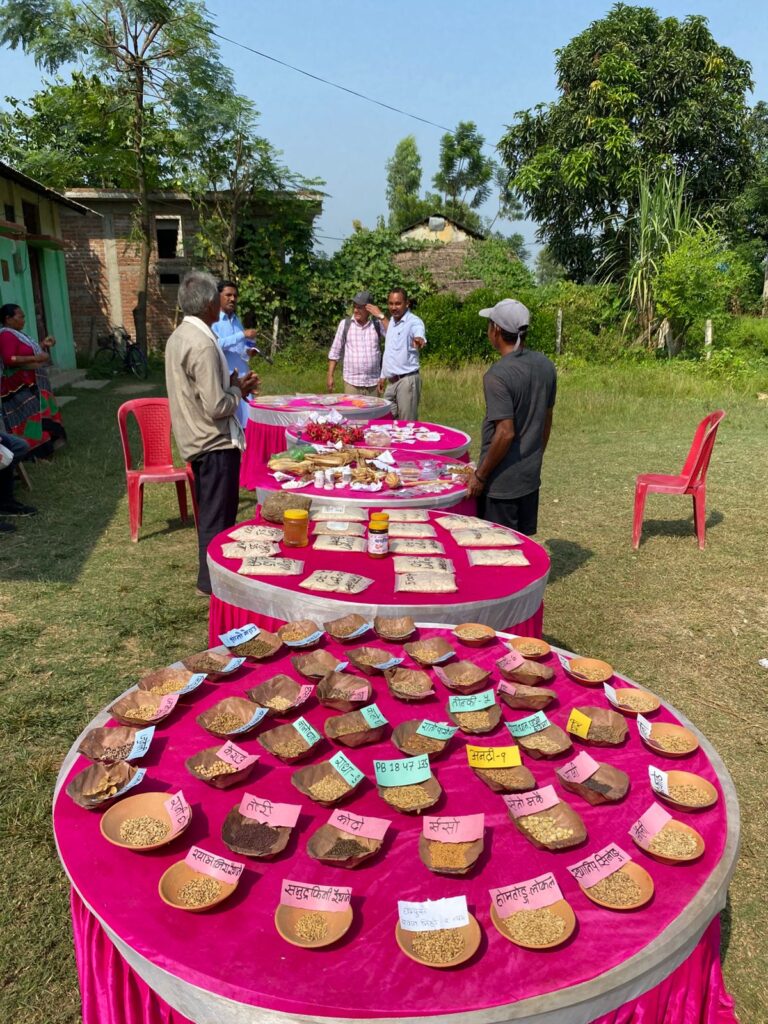
On October 22, the participants visited the Maigar Community Organization in Birendranagar(Bardiya) to see and learn the community initiatives in rural Nepal. The Maigar Community Collective presented their activities regarding the seed saving initiatives and rice diversity blocks with a view to conserve the local seed diversities. A seed exchange was held on the premises of the community collective building where seeds brought by different participants and local collective were shared with each other. A tour to the local nursery and diversity block were also organized in the village. After lunch, the participants visited another village, namely Khajura of Banke district, to see and learn about the seed bank functioning by a local cooperative called Janajagaran Samaj. It was a good opportunity to learn about how a community managed institution is engaging with communities in the process of seed procurement and marketing.
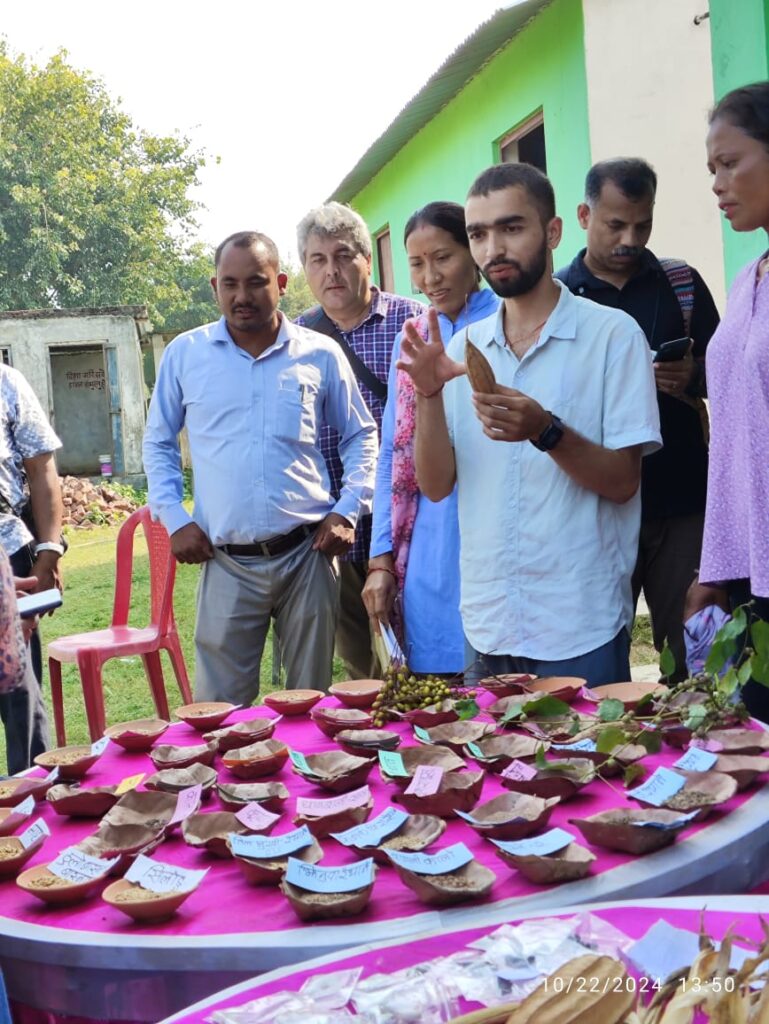
On October 23, the team reflected on the field visits and other presentations shared throughout the workshop sessions. They divided into two groups and presented about their learnings and feedback on both strengths and weaknesses on the community seed saving system. The team left Nepalgunj in the afternoon of that day.
Overall, the program was well organized and very informative. It left us with many takeaways that will definitely help the planning and implementation of people-led seed system work at Keystone.

